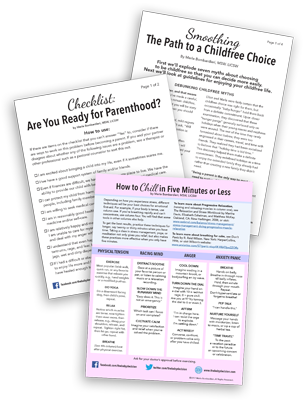
Deciding to not have children and stay childfree can be a long, difficult process. Read below to learn how our own Katie Wilson overcame her anxiety about the choice, and discovered other nurturing ways of parenting — with her husband’s full support. — Merle
Deciding to stay childfree
by Katie Wilson
:
I am childfree by choice and have been for just about six years, after realizing that I was feeling decided, largely as a result of being less preoccupied by the baby decision, as I approached my 40th birthday.
While I am confident in my decision today, this wasn’t always the case. Being undecided as to whether or not to have a child was agonizing and an extremely anxious time in my life. I have since had time to reflect on what it means for me to now be decided, and want to share with others who are in the midst of the same baby decision. I hope there’s something helpful to others here, regardless of the ultimate outcome and decision.
What does it feel like to be decided?
As I was struggling with the baby decision, I put a lot of pressure on myself to come to 100% certainty regarding whether I did or did not want to have a child. There are many decisions that I’ve made in life about which I was not 100% certain: changing jobs, choosing a place to live, getting into a relationship with a new partner.
However, the importance and irreversibility of having a child spelled out in my mind that I had better be 100% sure. My decision wouldn’t just impact my life, but the lives of others, including my partner and of course the life of any potential future child. Striving for 100% certainty caused me to spiral — I would feel decided and start moving toward a childfree-by-choice decision, only to sense some doubt or potential regret slipping in, and then I would be back to square one, wondering whether I wanted a child and bolting upright in bed in the middle of the night worrying where we would send our child to daycare and eventually school.
Meeting Merle and attending her workshop exposed me to the kinder reality that a decision does not need to be made out of 100% certainty. For some, a decision is 80/20, or even 70/30. Today, even as I feel confident in my childfree-by-choice decision, I ballpark that I am about 90% certain about my choice. The main thing that keeps me from being 100% decided is that if I did experience an unplanned pregnancy, I would consider having and raising the child.
However, this does not mean that I am undecided and living a life of regret that I didn’t have a child. To me, it means something quite profound — that there is a nurturing, parenting, mothering part of me that I can express in many ways, other than having a child. And it also means that the 10% of me that still questions whether I could have been happy as a mother no longer causes anxiety for me, but leads me to explore how I can fulfill those parts of myself.
Are you exploring the baby decision while pressuring yourself to reach 100% certainty before declaring a decision? Not to worry. You’re making progress. Maybe you’re at 90%, 80%, 70%. The parts of us that are still working out what it would be like to have a child are the parts of ourselves that we can support and nurture: the parts of us that want to create, to grow, and to develop others.
For those of us who decide not to have children, listening to these voices coming from within is not just key to managing the regret that presents itself, but also taking care of and developing ourselves.
The same is true for those who decide to become parents — what is that 10% of you that wanted to remain childfree telling you? What parts of a childfree life are appealing to you, and how can you have those in your life?
A deciding process, not a deciding moment
You may be wondering what the moment I made my decision was like. For me, this moment never came! I never experienced a bolt out of the blue or a key epiphany that made me realize I was now childfree by choice. Instead of a defined moment, I gradually came to feel more confident in my decision, and noticed that I was feeling less anxiety and agony. There was not a “before and after” moment for me that is clear in my mind, even years later. I simply realized that days and weeks were going by where I wasn’t thinking about it anymore.
Instead of a key moment that defined my decision, I realize now that I was gathering truths that would soon seem obvious to me, but that I couldn’t quite grasp as I was seeking clarity. As I explored the exercises in The Baby Decision, and other methods toward making a decision, these truths emerged, clear as day, each of them a critical point in becoming certain in deciding to stay childfree:
1) I had been happily childfree all of my life so far. Could I see this continuing? The answer for me was yes.
2) I saw many fulfilling ways that I wanted to be a parent to others: caring for my dog, my aging parents, my growing nieces and nephews, and being a good parent to myself. These nurturing ways may not be for everyone, but for me, I felt fulfilled being able to express my mothering side of me in caring for these people and things.
3) I had a beautiful conversation with my dad where I asked him why he had wanted so badly to have children. His response was that he wanted more people to love. I was so touched by his reflexive and honest response, but I also reacted by saying that I have enough people to love! We laughed, but this was a moment for me when I realized that while children were extremely important for my dad, I defined my family and community more broadly, and have since felt confident that I will have others to love and to love me and that there will be no shortage of community and family and that I will not be alone.
4) Finally, in an anecdote I shared in Merle’s book, I realized that many people my age whose children were now grown and leaving home would soon be childfree in their own right, as well. They would be living a sort of childfree lifestyle, but with adult children who had grown up and started lives of their own. This made me feel less alone and was also extremely comforting to me. Life keeps changing, people keep changing…children won’t be children forever and adults keep learning and growing.
In some ways it was as if my husband and I were getting a little head start to this point in our lives, and I started seeing options to consider what this point in our lives would mean to us — not necessarily retiring early, but benefiting from the freedom and savings that we have to engage in different aspects of our childfree lives together.
Because this decision was not a bolt out of the blue, we didn’t really have a moment that we celebrated the start of our childfree-by-choice lifestyle, or make an announcement to our loved ones and community. In fact, so many people in our community were aware of this process and journey and they saw it evolving over time and were aware when the decision was made.
While this decision was not marked by a special trip or a big change, such as moving to a different place, my husband and I continue to explore aspects of our childfree-by-choice life together, like being more open to travel and spontaneous pursuits, as well as preparing for our future and the futures of our aging parents and our nieces and nephews.
My husband’s role
In case you’re wondering where my husband was in this decision-making promise, he was supportive, but the decision rested very much on me. He leaned very heavily on also deciding to stay childfree — but also told me that he could get excited about having one or more children if it ended up being what I wanted.
This complicated the entire process for me, as I felt alone in many ways and also felt very guilty that he was willing to make such a sacrifice if I did in fact decide that I wanted a child. Looking back, I now know that if I had decided that I wanted to have a child, we would have then had numerous conversations. We would have talked about how I could support him in maintaining some aspects of the childfree lifestyle that he would be giving up, and how I could respect and honor his sacrifices by ensuring that these needs were met.
Knowing more about this discussion at the time of my decision would have been helpful — we could have engaged in earlier conversations to explore how his needs could have been met, had I decided to have a child. I think this would have taken some pressure off and would have helped the process.
In sum
We don’t make these decisions in a vacuum. They are complicated by our culture, our society, by expectations and by those whom we love and who love us. Constantly seeking out tools and supportive resources, as well as therapy, and being honest with ourselves and our partners — this is the process that gets us to our decisions. It isn’t easy and it isn’t fast.
I wish you all the same peace of mind and happiness that I now feel in deciding to stay childfree — whatever the right path may be for you.
— Katie
What has worked for you?
.
Are there any strategies that have worked for you for talking about not having children or avoiding / managing such conversations? Tell me what’s worked or not worked for you in the comments below, or in our Facebook group called “The Decision Café” — or on my growing Instagram page!
You can find more helpful posts from me and other contributors online here and in my bi-monthly email newsletter. If you aren’t subscribed yet, please stay in touch and quickly sign up here or the pop-up box below.
You can contact me on social media, or use the comments section here, or send an email using my online contact form.
Photo on this page by Arnel Hasanovic on Unsplash.com

